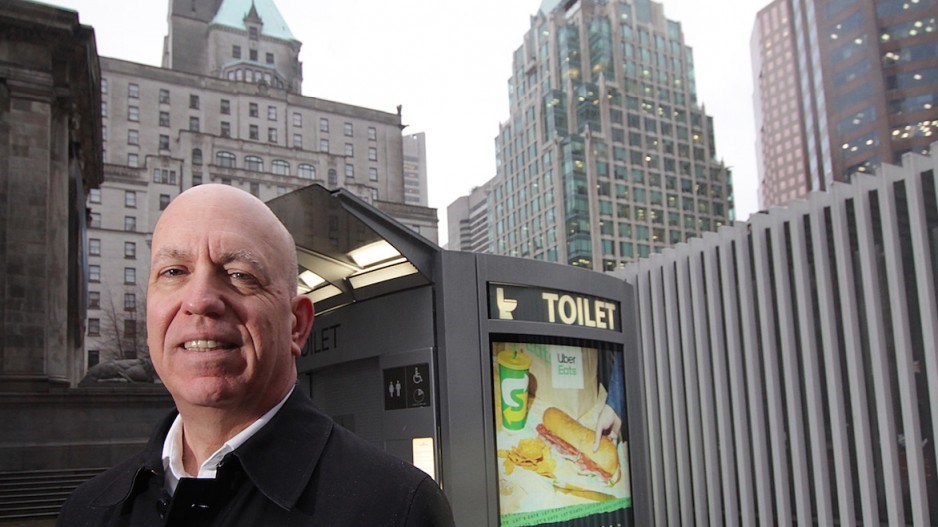Â鶹´«Ă˝Ół»business owners and advocates are urging the city to install more public toilets and extend hours of existing facilities.
Many of the scarce city-operated automated public toilets (APTs) close at 10 p.m. — long before area bars close. That leads to public urination outside businesses, leaving owners to clean up with bleach and power-washing outside their doorways or risk having customers avoid the area.
Downtown Â鶹´«Ă˝Ół»Business Improvement Association (DVBIA) CEO Charles Gauthier said public urination, along with homelessness and property crime, are topics that arise whenever his organization surveys its thousands of members.
“It’s not just homeless people who need the public washrooms,” Gauthier said. “People go to bars and nightclubs, and they tend to go, mostly men, to the back lanes to relieve themselves. That’s one of the concerns that our business members have.”
Ann Chan, an employee at the Opticana Eyewear store at 570 Seymour St., told Business in Vancouver that she and others in her store “often” have to clean the outside of the store because people have urinated outside.
“It’s probably once a week, or every two weeks,” she said. “It’s worse in the summer.”
Things are worse at the IGA store on the northeast corner of Robson and Richards streets.
“There’s urine outside in the corners at least three times a week,” the store’s owner, David Sullivan, told BIV. “The back alley is perpetual with everything you can think of — feces and urine.”
Weekends, he added, are the worst. His staff uses biodegradable bleach and splashes water to eliminate the smell. He agreed with Chan that the problem intensifies when weather gets warmer and that the situation can be “unbearable” in the summer.
The city operates an APT about half a block west of Sullivan’s store, but he said that the facility blends into the streetscape and many people are likely unaware it exists.
That is the only APT in the DVBIA’s region that is open 24 hours, according to city data. The city’s most recently added APT, near the art gallery on Howe Street near West Georgia Street, closes at 10 p.m. So does one at the corner of Robson and Granville streets. Others, such as one at Nelson and Howe streets, are not operating, according to the city.
The city said in a statement to BIVĚýthat the city installed an evening timer to close some APTs at 10 p.m. because of “heavy abuse activity and vandalism.”
It added that some city-owned washrooms have been identified as high-risk sites for drug use and overdoses.
That is no excuse, according to Gauthier, who said he is “disappointed” that the washrooms are not open around the clock.
Heightening his concern is that there are some small longer-term encampments that exist in his 90-block district, and he does not think the city is taking sufficient action to end homelessness.
“It’s a cop-out that our elected officials are not focused on addressing these issues, and they feel it’s appropriate that people can sleep in parks and sleep on sidewalks,” he said.
“I think that needs to be addressed. I don’t think that’s where people should sleep. We should try to find some other solutions to this issue and offer people safe and clean temporary shelters.”
The city started installing APTs on streets in the lead-up to the 2010 Olympic Games, and city statistics show that nine such facilities are operating in the downtown peninsula thanks to a city contract with Outfront/JCDecaux. One is undergoing extensive repair and another, at Nelson and Howe streets, is set to open soon. Plans are in the works for three more, according to the city.
“The majority of public washrooms are in locations such as recreation centres, libraries and parks,” the city said. “In addition, the city operates two comfort stations — underground washrooms: one at Main and Hastings and the other at Victory Square.”Ěý
Ěý



